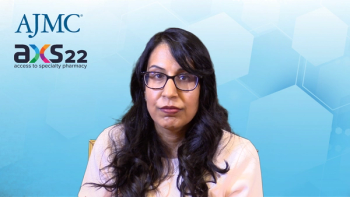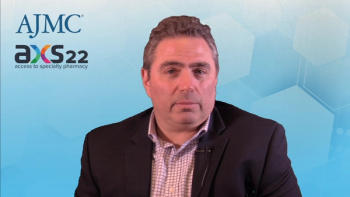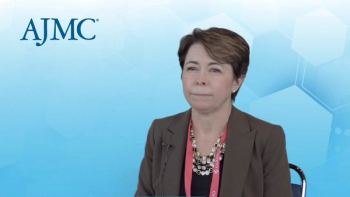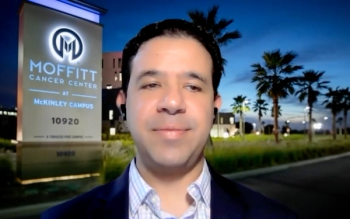
While CMS has started making changes to address health equity through policy and payment models, commercial plans are waiting to see the outcomes before they follow suit, said Jayson Slotnik, partner, Health Policy Strategies, Inc.

While CMS has started making changes to address health equity through policy and payment models, commercial plans are waiting to see the outcomes before they follow suit, said Jayson Slotnik, partner, Health Policy Strategies, Inc.

Robert Sidbury, MD, MPH, chief, division of dermatology, Seattle Children's Hospital, discussed the emergence of effective therapies for the management of atopic dermatitis and how dermatologists and other providers involved in patient care can better promote earlier use of these treatments.

Marc-Andre Cornier, MD, professor and director of the Division of Endocrinology, Diabetes and Metabolic Diseases at the Medical University of South Carolina, discusses the importance of a combined approach to weight loss.

After the Oncology Care Model (OCM) expires at the end of June, Tennessee Oncology will take what it learned from the model and apply it to commercial value-based care arrangements and potentially the next Medicare model, said Leah Owens, DNP, RN, executive director of care transformation at Tennessee Oncology.

Debra Patt, MD, PhD, MBA, executive vice president of Texas Oncology, discusses how community oncology practices have heightened their outreach efforts to entice patients back in for cancer screenings and the importance of thinking outside the box to overcome staffing shortages in the oncology space.

The impact that the adalimumab biosimilars will have in 2023 is going to depend on when they all get to market, said Doug Long, MBA, vice president, industry relations, IQVIA.

Anna Marzec-Bogusławska, MD, MPH, managing director, National AIDS Center, Warsaw, Poland, discusses how stigma and discrimination permeated the beginning of the HIV/AIDS epidemic the country in the early 1980s and ways that advocates stepped up to overcome peoples’ fears.

Good telehealth is not about the technology, but rather the quality of service from the licensed professional, said Geoffrey Boyce, CEO of Array Behavioral Care.

Elaine Siegfried, MD, professor of pediatrics and dermatology, Saint Louis University Health Sciences Center, speaks on safety considerations for the use of Janus kinase (JAK) inhibitors in pediatric patients with atopic dermatitis.

Roxana Siles, MD, FAAAAI, staff in the Department of Allergy and Immunology at Cleveland Clinic and codirector of the Asthma Center at Cleveland Clinic, addresses the placebo effect seen in clinical trials of chronic cough treatment.

Hilary Baldwin, MD, medical director, Acne Treatment and Research Center, discusses new therapies for acne and unmet needs for the condition.

Marc-Andre Cornier, MD, professor and director of the Division of Endocrinology, Diabetes and Metabolic Diseases at the Medical University of South Carolina, describes the genetic factor that contributes to obesity risk.

Biomarker testing is having growing importance to ensure that patients are started on the correct therapy for the best outcomes, said Sneha Sharma, PharmD, director, specialty clinical solutions, Magellan Rx.

Addressing rural care is a way of addressing health inequities, and the Biden administration’s recent investment in rural care reflects its commitment to addressing health equity, said Ryan Urgo, MPAP, managing director, health policy, Avalere.

Alexis Garcia, PharmD, senior director of business development at Tabula Rasa HealthCare, explains the importance of up-to-date data when implementing medication therapy management programs.

The pandemic drove telehealth usage, but it has challenges that might prevent doctors from prescribing new therapies, said Doug Long, MBA, vice president, industry relations, IQVIA.

Health plans and payers have plenty of options for how to analyze the effectiveness of digital therapeutic tools, as there are several effective strategies, according to Soumya Vishwanath, PharmD, of Magellan Rx Management.

Value-based payments were a benefit during the pandemic, but it remains to be seen if patients are interested in keeping those changes in care delivery as the pandemic recedes, said Jayson Slotnik, partner, Health Policy Strategies, Inc.

Sharon Phares, PhD, MPH, discussed her new appointment as the chief scientific officer of the National Pharmaceutical Council (NPC) and her main priorities in honor of Women's Health Month.

The intent of metastatic disease treatment is palliative, not curative, so we try to prolong life and provide quality of life as much as we can, said Hatem Soliman, MD, medical director of the Clinical Trials Office, Moffitt Cancer Center.

The approval of aducanumab (Aduhelm) was very controversial. There are 3 promising Alzheimer disease drugs in the pipeline with trials evaluating the efficacy, and there is a huge unmet need for these therapies, said Ray Tancredi, RPh, MBA, CSP, divisional vice president, specialty pharmacy development and brand Rx/vaccine purchasing, Walgreens.

Steven Yeh, MD, professor of ophthalmology at the Truhlsen Eye Institute at the University of Nebraska Medical Center, discusses the length of Xipere's treatment benefits and potential learning curves regarding its suprachoroidal delivery mechanism.

Gary Owens, MD, president of Gary Owens Associates, discusses current treatments available for pulmonary arterial hypertension (PAH) and where future directions in research may lead.

Patricia Deverka, MD, MS, senior researcher, deputy director at the Center for Translational and Policy Research and Precision Medicine, University of California San Francisco, explains what multicancer early detection tests currently exist and the research needed to understand their clinical utility.

Gillian Woollett, MA, Dphil, vice president and head of regulatory strategy and policy at Samsung Bioepis, gives insight into what international markets the United States could look to as examples of good biosimilar adoption.

Jason Myers, PhD, CEO of the New Zealand AIDS Foundation, addresses how New Zealand promptly adjusted its delivery of services for people living with HIV and AIDS in New Zealand, with examples including HIV self-test kits, online counseling, and provision of mental health care assistance.

Geoffrey Boyce, CEO of Array Behavioral Care, explains how Array is responding to the increasing demand and utilization of mental health and behavioral services.

Avalere is presenting at Asembia’s 2022 Specialty Pharmacy Summit, and Ryan Urgo, MPAP, managing director, health policy, discusses possible drug pricing policy options on the table for the Biden administration to consider in a midterm election year.

Marc-Andre Cornier, MD, professor and director of the Division of Endocrinology, Diabetes and Metabolic Diseases at the Medical University of South Carolina, explains how the mechanisms of mindfulness may help those with obesity lose weight.

William Schaffner, MD, medical director at the National Foundation for Infectious Diseases (NFID), and Patsy Stinchfield, RN, MS, CPNP, president-elect of NFID, explain what strategies they look forward to being implemented in the prevention and treatment of respiratory syncytial virus (RSV).

259 Prospect Plains Rd, Bldg H
Cranbury, NJ 08512
© 2025 MJH Life Sciences®
All rights reserved.
